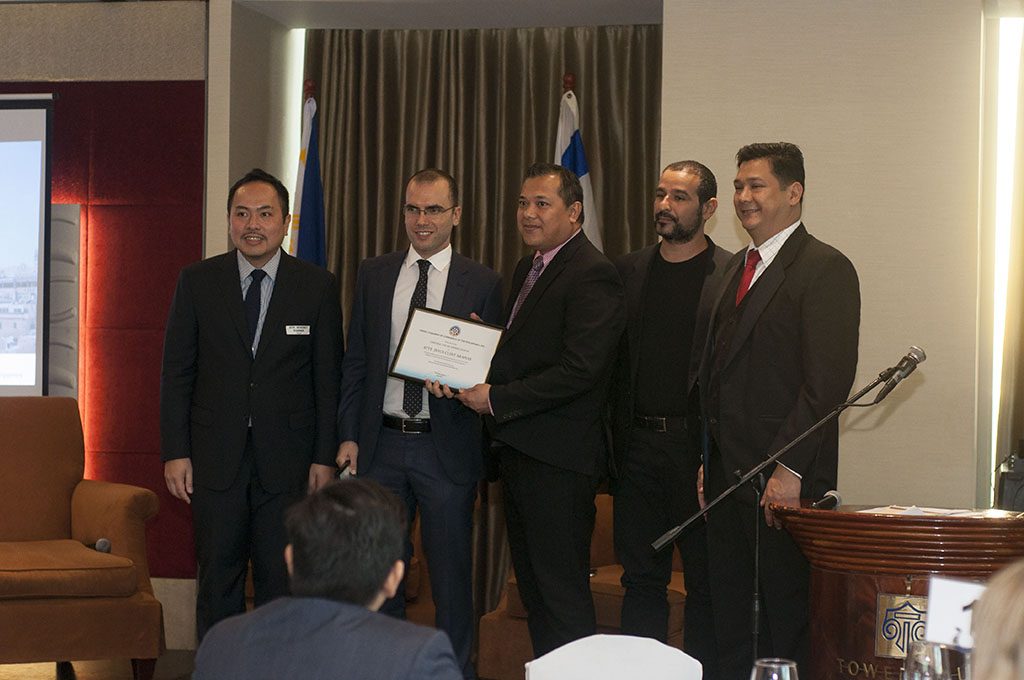Business Forum on Taxation and Incentives

Bureau of Internal Revenue Deputy Commissioner of Legal and Inspection Group, Atty. Jesus Clint Aranas; ICCP President, Itamar Gero; Tax Management Association of the Philippines President, Atty. Benedict Tugonon; ICCP VP for Internal Affairs, Haim Katzav and ICCP VP for External Affairs, Anton Mauricio at the Business Forum on Taxation and Incentives.
Tax professionals, business executives and investors gathered last November 29, 2016 for a forum on taxation and incentives with Atty. Jesus Clint Aranas, the Bureau of Internal Revenue’s Deputy Commissioner of Legal and Inspection Group and Atty. Benedict Tugonon, Tax Management Association of the Philippines President. The forum produced an interesting discussion, garnering insights from both the government and private sector.
Philippine Government’s Direction and the Tax Reform Program
Atty. Aranas stressed the importance of foreign investments in the growth of the national economy. Investors naturally take a look at the tax system of the country first. The current administration intends to reform the tax system to make it really responsive to the needs of the country. It aims to attain peace within the Philippine borders and with neighboring countries, and build a nation of law abiding citizens. The vision is to reduce the national poverty rate from 26% to 17% by the end of 2022, with the goal of lifting 10 million Filipinos out of poverty and transforming the Philippines into a primarily middle-class economy.
This economic plan requires investments, with the government looking to focus on infrastructure, education, health, social and natural resources sectors. In turn, it will be complemented by a simple and efficient tax reform program.
The program revolves around reforms to the personal income tax and consumption tax systems. The plan is to reduce the maximum rate of personal income taxes to 25%, except in the cases of the country’s highest income earners. There will be a shift in the modified gross system that will further simplify the income tax system.
Since the tax reform may result in income tax revenue losses, the government plans to implement a number of offsetting revenue measures involving the value added tax (VAT) and excise tax systems. There will be an expansion of the VAT base by limiting exemptions for raw food and other necessities such as education and health. They also intend to increase excise taxes for petroleum products and automobiles.
The government is looking at executing and implementing these reforms by the 2nd quarter of 2017 or by the end of June 2017.
Impact of Philippine Tax Reforms
Meanwhile, Atty. Tugonon provided the private sector’s point of view, sharing that legislative, as well as tax administration reforms, are both needed, and some are already in place. The Philippines has the highest income tax rate in the region. Focusing on the current personal income tax system, people earning only PhP 500,000 per year, which is the highest tax base, are already subjected to the highest income tax rate of 32%, compared to Singapore’s 20% for an annual income of more than PhP 10,600,000. The latter has been in place since 1986, with no adjustments for 30 years.
On a comparative effective tax rate (with a taxable income of PhP 500,000), the Philippines’ effective tax rate of 25% is still the highest among ASEAN countries, including Singapore, which has 0% tax.
Amending the tax code and other tax laws is not an easy thing to do and needs the cooperation of both the government, taxpayers and other citizens working together. People are encouraged to compute their tax due using the proposed tax brackets and voice out concerns.
Voluntary tax payment is 98% of the total tax collection of the BIR. Increasing the tax base by raising the number of registered and paying individual taxpayers will help increase tax collection and equitably spread the tax burden to everybody. Currently, only 20 million of the 120 million population have tax identification numbers (TIN). The more the taxpayers, the easier it will be to lower tax rates.
Sacrifices will have to be made by many as the government needs to collect more taxes. However, there is a shared optimism that the proposed tax reform can help the Philippines decrease poverty, improve infrastructure, increase the income of Filipinos over a period of time, and induce faster growth in the economy.
If countries like Singapore can reduce their tax rates through their high level of tax compliance, efficiency, and investment-oriented government, the Philippines should look forward to achieving a similar tax environment.











